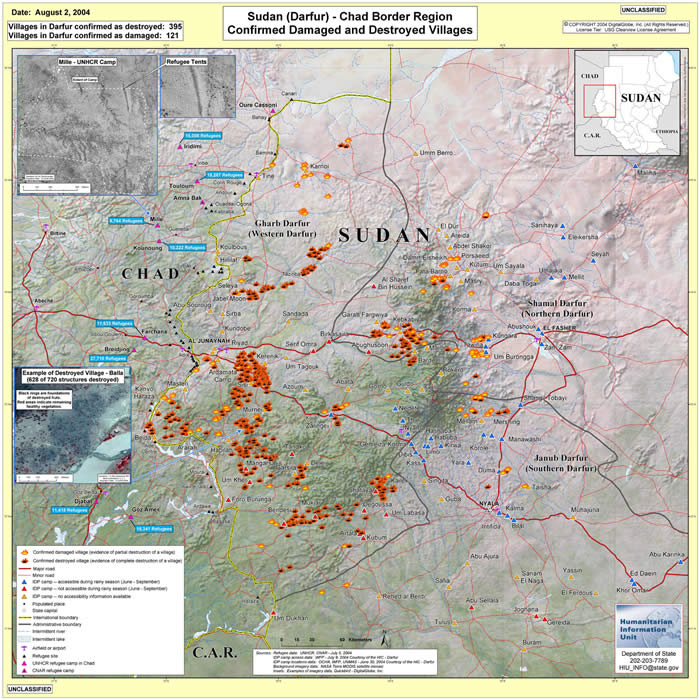
Ilankai Tamil Sangam
Association of Tamils of Sri Lanka in the USA
Published by Sangam.org
by Nicholas Kristof, The New York Times, April 17, 2007
|
Americans often misunderstand genocide, assuming it is impossible to stop because it is driven by millenniums of racial or ethnic hatreds. But historically genocide has mostly been rooted in cool, calculated decisions by national leaders that the most convenient way to solve a problem or stay in power is to scapegoat and destroy a particular group. |
 |
| Confirmed damaged and destroyed villages in Darfur (www.physics.utah .edu/~ dzevad/project.html) |
Perhaps the most surprising thing about President Omar Hassan al-Bashir of Sudan isn’t that he has presided over the systematic slaughter of hundreds of thousands of men, women and children who are members of black African tribes.
It is that President Bashir’s own family appears to come from an African tribe. Yes, Mr. Bashir has led a genocide against people like himself.
As best I can establish from my contacts in Sudan, Mr. Bashir’s grandfather was from the Falata tribe and grew up in Nigeria. He migrated to Sudan to work on the Gezira irrigation project and settled in a village called Um Audam.
Then the grandfather was killed in a dispute, and Mr. Bashir’s father and grandmother moved to Hash Banaga in the Arab north. Mr. Bashir grew up speaking Arabic, so in that sense he is Arab — but by heritage he is Falata and a black African.
Americans often misunderstand genocide, assuming it is impossible to stop because it is driven by millenniums of racial or ethnic hatreds. But historically genocide has mostly been rooted in cool, calculated decisions by national leaders that the most convenient way to solve a problem or stay in power is to scapegoat and destroy a particular group. So it has been in most past genocides, and so it is again in Darfur.
Nor is Mr. Bashir the only person in such a position. The on-and-off leader of the janjaweed militias, Musa Hilal, has unleashed his soldiers with particular brutality on another black African tribe, the Zaghawa. You can drive for hours through Zaghawa regions of Darfur where every single village has been burned; only corpses are left, and some of those have been stuffed into wells to poison them.
Yet, according to people from Musa Hilal’s hometown, his own mother is Zaghawa.
Likewise, the rebels of Darfur have sometimes turned on their own tribes — raping and murdering their own people, or those of allied tribes.
So what motivates these people? Not ancient hatreds, but greed. They are not Taliban-style extremists, but rather amoral, ruthless, calculating opportunists.
Mr. Bashir and others in his government faced a genuine problem back in 2003: African tribes (including the Zaghawa) were staging a rebellion in Darfur. Calling in the army to fight the rebels was problematic because many soldiers in the regular army are from African tribes in Darfur and might not be reliable in combat against their brethren.
 |
This village has been burned to the ground. Only the blackened foundations of former homes remain. |
So Mr. Bashir adopted an approach he had already used against rebels in southern Sudan. He armed irregular militias and gave them license to wipe out civilians and depopulate large areas. This would deprive the rebels of their base of support and send a warning to any other tribe in Sudan that might contemplate a rebellion.
Presumably Mr. Bashir guessed that foreigners might not like the idea of mass murder. But he could deny visas to prying journalists, and he had Chinese diplomatic protection at the United Nations.
So after weighing the pros and cons, Mr. Bashir decided that genocide was the simplest counterinsurgency method. Some of the marauders were driven by prejudice, and Arab attackers routinely shouted racial epithets against blacks. But the leaders —— they were just cynics. Musa Hilal and some of the rebel commanders seemed to view murder and rape simply as paths to accumulate power and livestock.
All this makes genocide easier to stop than people imagine. Where it arises from a weighing of costs and benefits, then it is possible for outsiders to impose additional costs and change the outcome. That’s what we need to do. The U.S. should lead other countries in pushing hard on all sides for a negotiated peace agreement among the warring factions, for that is ultimately the best hope to end the slaughter in Darfur and in neighboring areas in Chad and the Central African Republic.
I find President Bashir’s ruthlessness pretty easy to understand. What is harder to fathom is President Bush’s refusal to stand up to the genocide for four years. Why not impose a no-fly zone, why not hold an international conference on Darfur, why not invite survivors to the White House for a photo-op, why not give a prime-time speech about Darfur?
Perhaps the explanation for Mr. Bush’s passivity is the same as the explanation for Mr. Bashir’s brutality. Maybe Mr. Bush has made his calculations, looked at the number of calls and letters he gets about Darfur, weighed the pros and cons, and decided that Americans really don’t care enough about genocide to make him pay a major price for allowing it to continue.
© 1996-2025 Ilankai Tamil Sangam, USA, Inc.